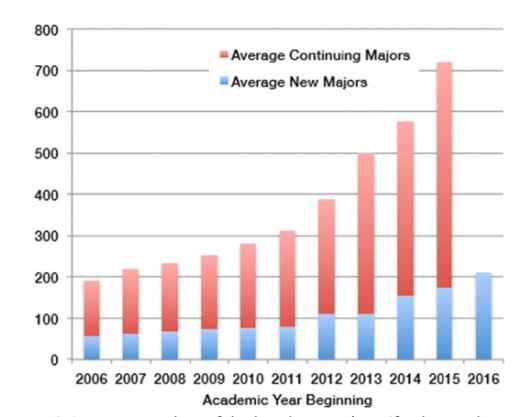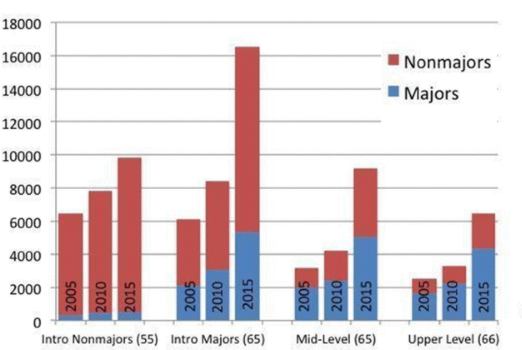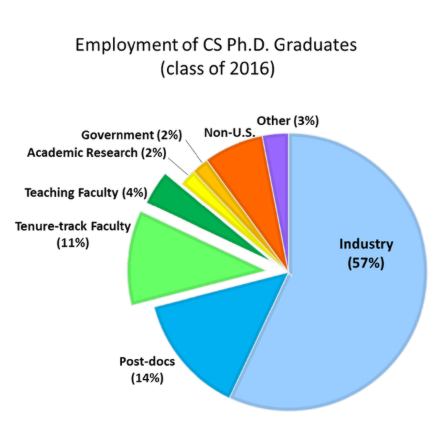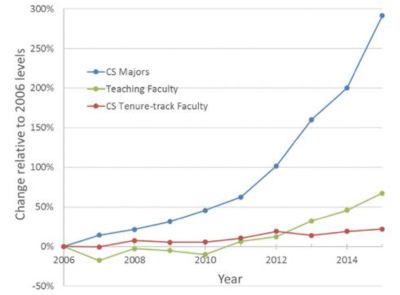| Increase In Uptake of Computer Science Challenges Universities |
| Written by Sue Gee | |||
| Monday, 13 November 2017 | |||
|
The current surge in undergraduate enrollments in Computer Science courses and degree programs is straining resources at many U.S. colleges and universities according to the National Academies of Sciences, Engineering, and Medicine.
The newly published report, Assessing and Responding to the Growth of Computer Science Undergraduate Enrollments, provides ample evidence of a trend that we have repeatedly commented on - that of the marked increase in the number of US university and college undergraduates opting for computer science. Its headline finding is that the number of bachelor’s degrees awarded nationally in computer and information science has increased by 74 percent since 2009, compared to a 16 percent increase in bachelor’s degrees produced overall. Moreover, as this chart based on data from the CRA Taulbee Survey indicates, the statistics suggest that the number of students attaining computer science bachelor’s degrees is likely to continue to rise for at least the next several years.
Interest in the CS courses has also grown dramatically among non-majors: One interesting point in this chart is that the number of non-majors in courses intended for CS majors is increasing at a rate equal to or higher that that for majors. The report states: Between 2010 and 2015, introductory CS course enrollment increased by an average of 158 percent for majors and 169 percent for non-majors; enrollment in the mid-level course increased by 148 percent for majors and 248 percent for non-majors; enrollment in the upper-level course increased by135 percent for majors and 144 percent for non-majors. In our previous reports noting Students Flocking to Computer Science, we have seen the increase in the popularity of CS degrees as being a positive, commenting, for example: The fact that the number of Computer Science concentrators at Harvard has increased each year for the past five years, from 86 in 2008 to 153 in 2013 shows that the message that gaining a CS degree is good for your employment prospects is being taken notice of. As we reported earlier this month with reference to US Bureau of Labor Statistics, possession of CS degree is acknowledged to open the way to well-paid jobs in industry and while this is good for students, and has led to more of them choosing to study it, it is a problem for educational institutions. According to the report: The most common challenges cited by departments include increased faculty workload; too few faculty, instructors, or teaching assistants; greater need for academic undergraduate advisers and administrative support; and increased need for classroom, lab, and office space. In recent years over half of new Ph.D.s in computer science have taken jobs in industry, posing challenges to finding faculty. Data indicate that from 2006 to 2015, the average increase in tenure-track computer science faculty at research institutions was only about one-tenth of the increase in the number of computer science majors.
The report sets out a range of alternative strategies for addressing the problem, one of which is to: "seriously consider increasing the number of academic-rank teaching faculty." Among the option discussed is that of limiting the number of students allowed to study Computer Science. With regard to this the National Academies' Press Release states: While some institutions may view imposing limits on enrollment in computer science programs and courses as desirable or inevitable, they should carefully consider the consequences before doing so, the report says. Such limits may cut students off from their true passion, and they may introduce an environment of real or perceived competition among students who desire to enter a program, which could discourage participation among underrepresented groups. So here's the situation. Over the past 5 years or more we've seen successive initiatives to promote Computer Science as a topic to be included throughout the school curriculum and also be promoted outside the classroom. Starting from modest beginnings with CS Education Week, the idea snowballed when Code.org's Hour of Code was promoted not only by tech industry leaders such as Bill Gates and Mark Zuckerberg but also by role models from the worlds of sport and entertainment and was enthusiastically endorsed by then-President Barak Obama. In his final State of the Union Address in January 2016 Obama introduced his “Computer Science for All” initiative, which included $4 billion in funding for states and $100 million directly for districts to increase access to K-12 computer science education by training teachers and expanding access to instructional materials. Since then we've seen CS become an official STEM subject and the launch of K-12 Computer Science Framework drawn up by Code.org together with the ACM and other partners in collaboration with states and districts and the expansion of and encouragement of participation in AP Computer Science. On theme common to all these initiatives is to encourage participation of "underrepresented groups", namely girls and Hispanic/Latino, African-American and American Indian/ Alaska Native students. While it revealed that the longstanding under-representation of women and some minority groups among computer science bachelor’s degree recipients had not improved significantly as of 2015, the last year for which national data are available, the report found some evidence that representation may be improving among students currently majoring in or interested in majoring in computer science and stressed the importance of supporting diversity and should leverage the growing interest as an opportunity to recruit and retain more women and underrepresented minorities into the field. The report makes recommendations for attracting and retaining sufficient faculty including: Increasing the number and enhancing the role of academic-rank teaching faculty should be give serious consideration. Another approach could be interpreted as a move to emulate MOOCs, which have had a significant impact in widening access to computer science not just in the US but globally. The recommendation is: Institutions should pursue innovative strategies for using technology to deliver high-quality instruction at scale to large numbers of students. It goes on to suggest that the National Science Foundation, which last year awarded grants to look at the impact of pre-college CS computing could support research on how best to use technology in teaching large classes. There already is a lot of evidence for the effectiveness of MOOCs and MOOCs are already in a position to bolster on-campus Computer Science. Take, for example, the edX MOOC Introduction to Computer Science and Programming Using Python from MIT. It can now count as 3 credit hours towards a degree courtesy of edX partner Charter Oak State College, Connecticut's public online college, and transferable to other educational establishments. Expanding such transferable credit schemes could take pressure off institutions that didn't have the resources to teach Computer Science and still offer it to non-majors while those with the best CS courses could share their expertise more widely.
More InformationColleges and Universities Should Take Action to Address Surge of Enrollments in Computer Science Assessing and Responding to the Growth of Computer Science Undergraduate Enrollments (2017) K-12 Computer Science Framework Related ArticlesStudents Flocking to Computer Science Computer Science Enrollments On The Up Improve Your Hiring Prospects With Computer Science Zuckerberg, Gates And More Promoting Computing In Schools $1.19 Million Study of Impact of Pre-College Computing Obama Unveils Computer Science for All Computer Science Officially US STEM Subject Arkansas Offers Incentives For AP Computer Science To be informed about new articles on I Programmer, sign up for our weekly newsletter, subscribe to the RSS feed and follow us on Twitter, Facebook or Linkedin.
Comments
or email your comment to: comments@i-programmer.info |
|||
| Last Updated ( Monday, 13 November 2017 ) |






